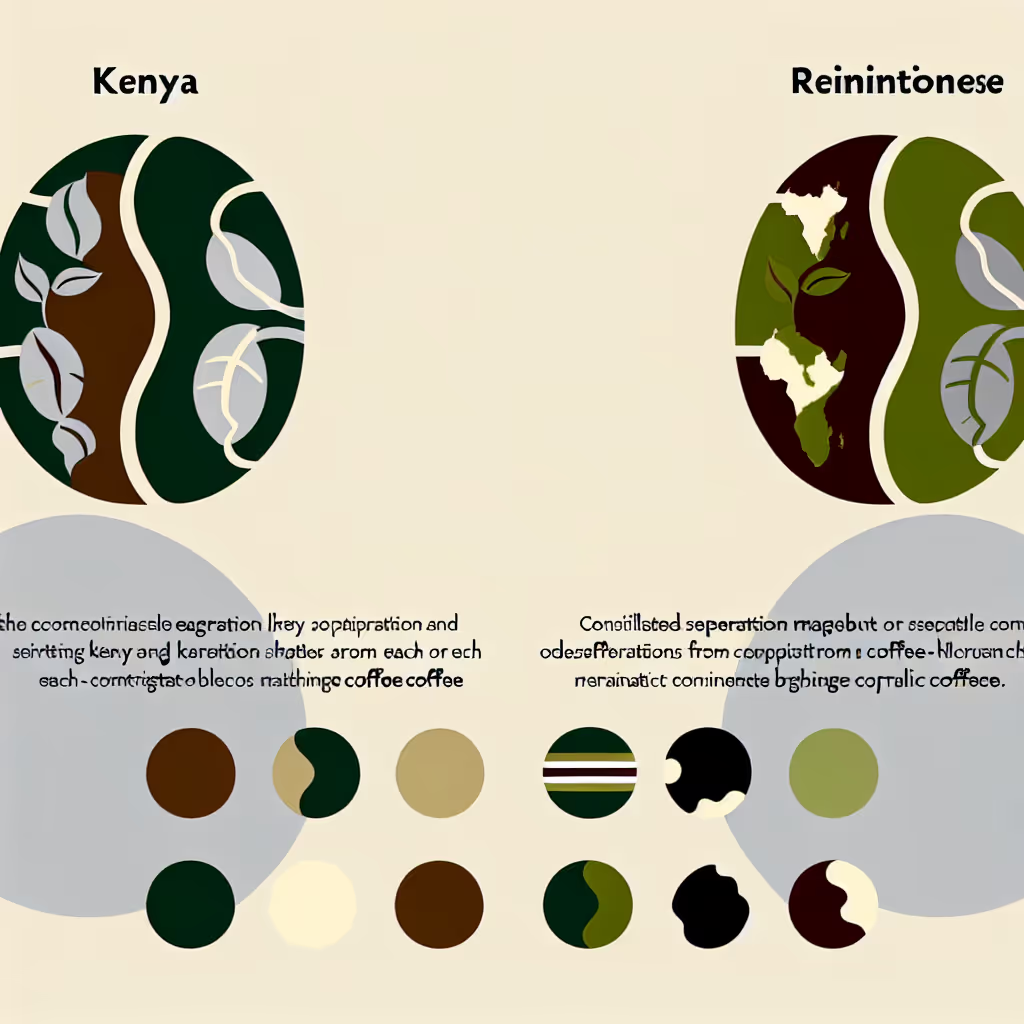Kenyan Vs. Tanzanian Coffee
This comparison explores the distinct qualities of Kenyan and Tanzanian coffee, examining their flavor profiles, growing conditions, and processing methods to help coffee enthusiasts make informed choices.

Brief Description
Kenyan coffee is renowned for its bright acidity, full body, and complex flavor profile. Grown in the rich volcanic soils of the Central Highlands, these beans benefit from ideal climate conditions and meticulous processing. The result is a cup that's bold, wine-like, and often described as the 'connoisseur's choice'. With notes ranging from blackcurrant to citrus, Kenyan coffee offers a truly unique and memorable tasting experience.
Tanzanian coffee is a hidden gem in the world of specialty coffee. Grown on the slopes of Mount Kilimanjaro and in the southern highlands, these beans offer a unique flavor profile that combines bright acidity with rich, full-bodied taste. Known for their wine-like acidity and black currant notes, Tanzanian coffees are often described as having a 'soft' cup with a gentle, sweet finish. The country's diverse microclimates and traditional farming methods contribute to the distinct character of its coffee, making it a favorite among connoisseurs seeking something extraordinary.
Importance of Comparison
Comparing Kenyan and Tanzanian coffee is crucial for coffee lovers seeking to explore the diverse flavors of East African beans. Both origins offer unique taste experiences, reflecting their specific terroir and processing techniques. Understanding the differences helps consumers find their preferred flavor profile and supports informed purchasing decisions, whether for home brewing or cafe offerings.
Key Attributes
Origin
Kenyan
Tanzanian


Consumer Guide
When choosing between Kenyan and Tanzanian coffee, consider your flavor preferences. Kenyan coffee is known for its bright acidity and complex profile with blackcurrant and citrus notes, ideal for those who enjoy a bold, wine-like cup. Tanzanian coffee offers a softer cup with a sweet finish, appealing to those who prefer a more balanced flavor. Both origins excel in pour-over and French press brewing methods, allowing their unique characteristics to shine. For cold brew enthusiasts, both origins produce excellent results. Consider trying both to experience the nuanced differences in East African coffees and determine which best suits your palate.
Expert Opinions
Coffee expert Maria Rodriguez notes, 'Kenyan coffee is often considered the pinnacle of brightness and complexity, while Tanzanian coffee offers a more approachable yet still distinctive cup.' Roaster John Smith adds, 'The double fermentation process common in Kenya contributes to its intense flavors, whereas Tanzania's diverse processing methods result in a wider range of flavor profiles within the origin.'
FAQs
Kenyan coffee is known for its bright acidity, full body, and complex flavors including blackcurrant and citrus. Tanzanian coffee offers a softer cup with wine-like acidity, black currant notes, and a sweet finish. Kenyan coffee tends to be bolder, while Tanzanian coffee is often more balanced.
Both countries grow coffee at high altitudes, but Kenyan coffee is typically grown at slightly higher elevations (1400-2100m) compared to Tanzanian coffee (1200-2000m). Kenya's Central Highlands feature rich volcanic soils, while Tanzania's beans come from the slopes of Mount Kilimanjaro and the southern highlands, each imparting unique characteristics to the coffee.
Both Kenyan and Tanzanian coffees excel with pour-over, French press, and cold brew methods. These techniques highlight the unique flavor profiles of each origin. Pour-over emphasizes the bright acidity, while French press accentuates the full body. Cold brew can bring out the sweet, fruity notes in both origins.
Kenyan coffee often undergoes washed processing with a unique double fermentation method, contributing to its distinct flavor profile. Tanzanian coffee uses a variety of methods including washed, natural, and honey processing, offering a wider range of flavor possibilities within the origin.
While both can be used for espresso, Kenyan coffee's brightness and complexity can create unique, fruity espresso shots. Tanzanian coffee's balanced profile and sweet finish often work well in milk-based espresso drinks. Ultimately, the choice depends on personal preference and the specific flavor profile desired in the final beverage.
Interestingly, both Kenya and Tanzania have similar annual coffee production levels, each producing around 50,000 metric tons per year. This similarity in output reflects the importance of coffee cultivation in both countries' agricultural sectors.
Conclusion
Both Kenyan and Tanzanian coffees offer exceptional quality and unique flavor profiles that showcase the best of East African coffee production. Kenyan coffee stands out for its bright acidity, complex flavors, and bold character, making it a favorite among those who appreciate a vibrant, distinctive cup. Tanzanian coffee, with its softer profile and sweet finish, provides a more approachable yet still remarkable coffee experience. Ultimately, the choice between these two origins comes down to personal preference and the specific flavor journey you're seeking. We encourage coffee enthusiasts to explore both origins to fully appreciate the diversity and quality of East African coffees.






